 Petzlover
Petzlover German Shorthaired Pointer is originated from Germany but Miniature English Bulldog is originated from United Kingdom. German Shorthaired Pointer may grow 28 cm / 12 inches higher than Miniature English Bulldog. German Shorthaired Pointer may weigh 14 kg / 31 pounds more than Miniature English Bulldog. Both German Shorthaired Pointer and Miniature English Bulldog has almost same life span. German Shorthaired Pointer may have more litter size than Miniature English Bulldog. German Shorthaired Pointer requires Low Maintenance. But Miniature English Bulldog requires Moderate Maintenance
German Shorthaired Pointer is originated from Germany but Miniature English Bulldog is originated from United Kingdom. German Shorthaired Pointer may grow 28 cm / 12 inches higher than Miniature English Bulldog. German Shorthaired Pointer may weigh 14 kg / 31 pounds more than Miniature English Bulldog. Both German Shorthaired Pointer and Miniature English Bulldog has almost same life span. German Shorthaired Pointer may have more litter size than Miniature English Bulldog. German Shorthaired Pointer requires Low Maintenance. But Miniature English Bulldog requires Moderate Maintenance
 Being a member of the Sporting Group, the German Shorthaired Pointer is a dog which was developed in the 19th century in Germany, and specifically for hunting. Hunters wanted a dog who could hunt all types of game and in all types of terrain.
Being a member of the Sporting Group, the German Shorthaired Pointer is a dog which was developed in the 19th century in Germany, and specifically for hunting. Hunters wanted a dog who could hunt all types of game and in all types of terrain.
There are quite a few different theories that exist regarding the origin of the German Shorthaired Pointer, but most experts believe that the breed came from a mix of old Spanish pointer and traditional continental pointers with further crossings of German Bloodhound and French Gascon to enhance scenting abilities.
The dogs popularity flourished in Europe and in 1891 the Klub Kurzhaar was founded to maintain the guidelines for this new and beautiful sporting dog.
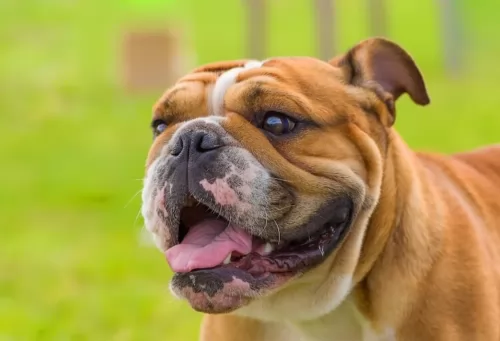 The Miniature Bulldog is such a cute little dog, hailing from England in the 18th and early 19th centuries. The exact development of the dog is unclear and it seems as though the breeders weren’t working together and were working in two different directions.
The Miniature Bulldog is such a cute little dog, hailing from England in the 18th and early 19th centuries. The exact development of the dog is unclear and it seems as though the breeders weren’t working together and were working in two different directions.
There is a lot of debate about the very name ‘miniature’ too because some breeders gave this name to a hybrid mix of a Pug and Bulldog. It seems some breeds were created by crossing English Bulldogs with French Bulldogs to decrease their size. Certainly the origins for the Miniature Bulldog are unknown and there isn’t one particular breeder who can be credited with developing the breed.
Because the Miniature Bulldog is a hybrid breed, it isn’t accepted by the AKC, but it is accepted by the American Canine Hybrid Club as well other registries.
 Athletic, muscular and sleek, the medium to large sized German Shorthaired Pointer is at home on land and water. He stands between 53 to 63cm in height and weighs roughly between 20 – 32kg.
Athletic, muscular and sleek, the medium to large sized German Shorthaired Pointer is at home on land and water. He stands between 53 to 63cm in height and weighs roughly between 20 – 32kg.
The eyes are brown, the ears are fairly long, they are floppy and set high on the head. The tail is always docked to a particular length and is held straight out from the body so that it actually forms a line with the entire body and the head.
The dog has a short coat which is essentially a combination of liver and white speckles or dappling.
A whole lot of factors come into play when looking at the temperament of a dog. The kind of owners the dog has can have a huge affect on the way he turns out. Nonetheless every dog, including the German Shorthaired Pointer will require training and socialization to become obedient and relaxed around strangers and other pets.
The German Shorthaired Pointer is an intelligent, confident, bold, affectionate dog that wants to please his owners and he is easy to train. He is good with children too, just loving all interaction with his human family.
He is an energetic dog and will require plenty of exercising to avoid him becoming bored, frustrated and destructive.
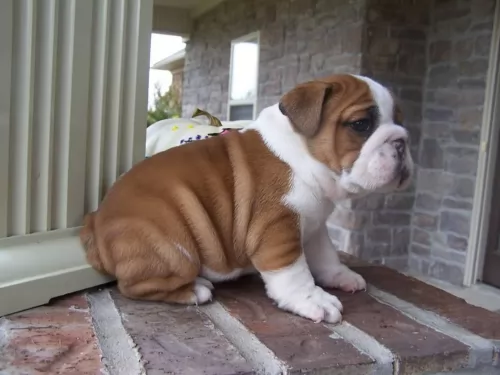 Because the Miniature Bulldog is a cross between two purebred breeds – the Pug and the English Bulldog. You can expect different looks and characteristics from each breed.
Because the Miniature Bulldog is a cross between two purebred breeds – the Pug and the English Bulldog. You can expect different looks and characteristics from each breed.
Your mini Bulldog is a small breed dog standing between 25 and 35cm male and female and weighing between 11 and 18kg. The average litter size for these dogs is about 4 puppies.
The Miniature Bulldog has a short coat which sheds moderately and that comes in different colors such as tan and white, brindle, with black and grey also having a show in.
The Miniature Bulldog is a social, friendly breed who is able to get on well with all members of the family, including children and pets in the home. His very stature makes it that he isn’t the most active of dogs, but nonetheless you still want to exercise him and take him for walks to avoid obesity.
As with all dogs, training and socialization are imperative because this is a strong-willed dog who wants to go his own way.
 As an intelligent hunting dog, the German Shorthaired Pointer is also a loving family companion and he just loves spending time outdoors with his human family.
As an intelligent hunting dog, the German Shorthaired Pointer is also a loving family companion and he just loves spending time outdoors with his human family.
He is pretty much an all-rounder – playful, energetic, a good watchdog and a loving and devoted family friend.
For an active, outdoor kind of family, include the German Shorthaired Pointer in all your activities and you’re going to ensure that you have a most wonderful 4-legged friend.
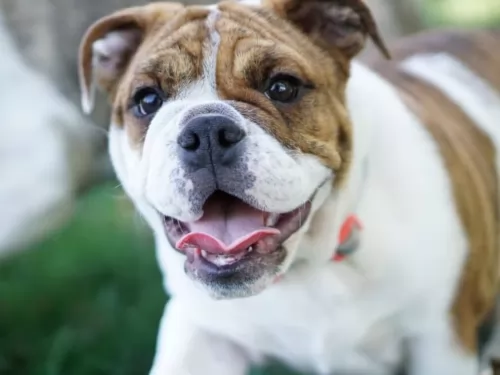 You’ll love having one of these entertaining, friendly dogs by your side. He is docile, social, fun and a bit stubborn too but he is able to get on well with children in the home as well as with other pets.
You’ll love having one of these entertaining, friendly dogs by your side. He is docile, social, fun and a bit stubborn too but he is able to get on well with children in the home as well as with other pets.
He can adapt to life in the city as well as in the countryside as he doesn’t require too much exercise.
Take special care of him and he’ll make you a splendid family pet.
 Most German Shorthaired Pointers are healthy dogs, but even so, just like with any other dog breed, they can be subject to some hereditary disorders as well as some of the other common dog illnesses there are -
Most German Shorthaired Pointers are healthy dogs, but even so, just like with any other dog breed, they can be subject to some hereditary disorders as well as some of the other common dog illnesses there are -
Dogs are such devoted family members that you just want to give in to them and pop the chocolate treats you love into their mouths. But dog’s can’t eat chocolate! Just one piece can affect a small dog. Symptoms of chocolate poisoning include diarrhea,vomiting, panting and shaking and even worse, a heart attack. If your dog has got hold of some chocolate, get him to the vet immediately.
Your German Shorthaired Pointer, as a puppy, should have his puppy vaccines. If your dog has this terrible disease, he will be lethargic, have diarrhea and almost seem out of it. Survival isn’t always guaranteed and the best way to avoid this killer disease, is to ensure your puppies vaccinations are up to date.
Check your pet for Bloat or an enlarged stomach which can twist because of trapped gas. This can be deadly for your pet. Get him immediately to the vet. He’ll be restless, lethargic and trying to vomit.
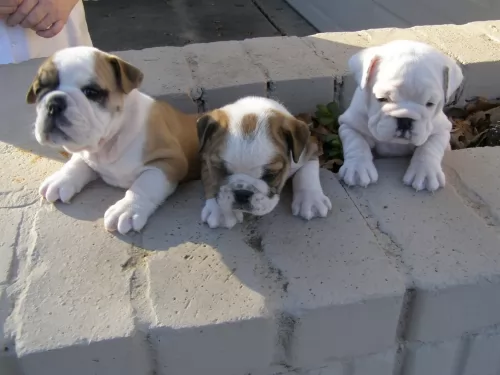 Unfortunately the origins of the Miniature English Bulldog are not 100% clear and therefore other important information isn't readily available.
Unfortunately the origins of the Miniature English Bulldog are not 100% clear and therefore other important information isn't readily available.
These dogs are always prone to breathing and nasal abnormalities because of the shape of their faces as well as being prone to heart deficiencies. Snoring, grunting and quite a bit of panting is part and parcel of the mini English Bulldog.
They’re also prone to overheating, cherry eye and hip dysplasia. It is most unlikely that your Miniature English Bulldog is going to get any of these illnesses and the good news is that he can live to be up to 12 years of age.
 The German Shorthaired Pointer isn’t a heavy shedder. He has a short coat which requires brushing at least twice a week to remove loose hairs and keep it shiny and sleek.
The German Shorthaired Pointer isn’t a heavy shedder. He has a short coat which requires brushing at least twice a week to remove loose hairs and keep it shiny and sleek.
Also check in- and outside the ears, clip his nails and brush his teeth 2 or 3 times a week.
Only the highest grade kibble will do. Mix in some of your own home-made cooked brown rice, vegetables and chicken from time to time and also ensure your pet gets in some raw meat as well. Cool, fresh water should be constantly available.
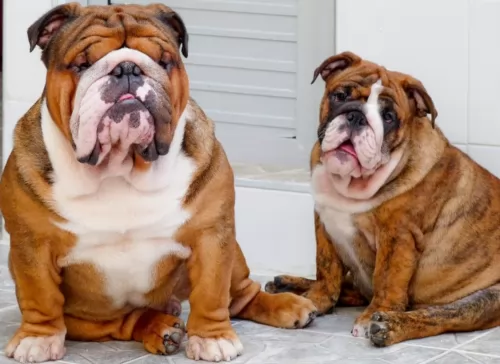 Feeding the Miniature English Bulldog is hugely important. It is imperative that he doesn't become obese. Buy the best dog food there is and see to it that he also gets some home-made food. Chop up boiled chicken, brown rice ad vegetables for your pet and mix occasionally into his dry kibble.
Feeding the Miniature English Bulldog is hugely important. It is imperative that he doesn't become obese. Buy the best dog food there is and see to it that he also gets some home-made food. Chop up boiled chicken, brown rice ad vegetables for your pet and mix occasionally into his dry kibble.
Dogs love simple food – their stomachs can’t cope with different foods. They appreciate consistency with uncomplicated but nutritious foods. The bulldog is a dog which can easily overheat, so make sure he has constant access to fresh cool drinking water. On a hot day you can even use a spray bottle and allow some spray mist sprayed into his face to cool him down.
The Mini English Bulldog is a dog that sheds so you will need to brush him at least twice a week to get rid of loose hair.
Check around his eyes and inside his ears for infection.
Brush his teeth 2 or 3 times a week to get rid of plaque so as to prevent dental decay which can be detrimental to his health.
His face and body have wrinkles, making him more susceptible to skin allergies and you’ll need to keep your eye open for these as they can be terribly painful and frustrating for your pet.
Keep his nails trimmed.
He is neither sleek, agile or quick and you can see just by looking at him that he isn’t designed for being sporty. A slow walk every day will be enough for him as well as some easy-going games inside.